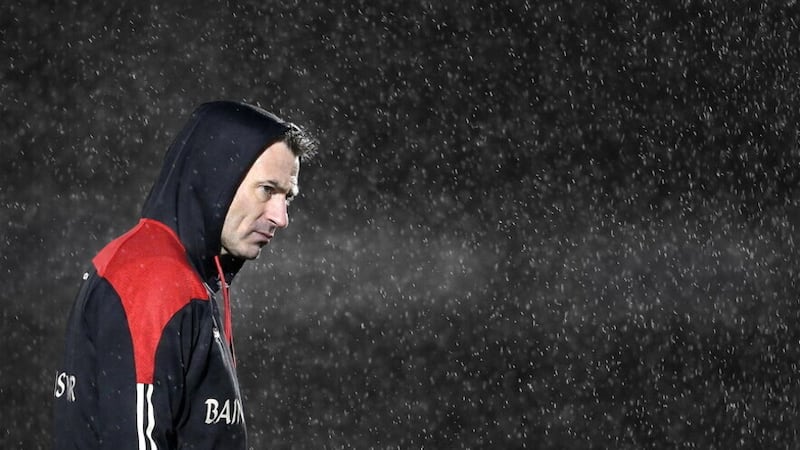WHEN the GPA’s representatives sat at the head of the Crowne Plaza Hotel’s Fahrenheit Suite last Thursday morning, they were a smitten crew.
Gaelic footballers are on the rebound from a decade of toxic defensive football and broken structures.
Everyone’s looking at this brand new proposal for Gaelic football’s championship format, one that Tom Parsons says will “breathe new life” into the sport, and they’re comparing it to what we’ve had for so long.
A pig in lipstick might still be a pig, but at least it has lipstick on.
From the moment the GPA held their press conference and put their backing behind change, it has seemed almost inevitable that change is what will occur on October 23.
The words of CEO Tom Parsons, co-chairperson Maria Kinsella and executive members Niall Morgan (Tyrone), Mickey Quinn (Longford) and Podge Collins (Clare) have never carried as much weight.
No change in the GAA’s recent years has been more significant than the pace of change itself.
An organisation that for so long had the whole place painted magnolia has gone full minimalist. There isn’t an autumn that passes now without some piece of the furniture being moved here or there.
This is the mother and father of all changes though.
Changing the championship structures so drastically after 130 years is not redecorating. It’s ripping it down to its foundations and starting over.
Boardroom football stuff is exactly like politics. The average Joe takes a passing interest. They know what they hear on the news or read in the paper. They feel they have no voice. And they trust that people in positions of power and influence will do the right thing by them.
On this occasion, I don’t blame the GPA one bit.
Their comments are a true representation of the thoughts of the players they represent.
A wave of momentum now moves behind changing the structures, one that will be hard for Special Congress to resist in two weeks’ time.
But in seeing all the flaws of what they currently have, are the players blinded by the shiny newness of what is now staring at them?
Proposal B (as if GAA politics isn’t boring enough, they give it that sexy title) is very different from what we have at present.
Moving the provincials into pre-season, de-linking them from the All-Ireland, and making that into a league-based competition ending with a last-eight knockout is about as radical a departure as you could imagine.
The basic thinking seems to be that what we have hasn’t worked in quite a while, so no matter what you change it to, it can’t be any worse.
It’s understandable and it’s not wrong.
The proposal on the table is better than what we have at the minute.
It has strong upsides. That it dilutes the provincial series, and de-links it from the championship proper, is the first prerequisite for meaningful change.
The league has been far superior to championship for many years now and it only stands to sense that you should try to harness that in the process of revamping the championship structures.
It would help bring greater balance to Kerry and Dublin’s ease of passage. They would be travelling into packed houses in Omagh, Clones, Ballybofey, Castlebar, and having to earn their top-four spot.
The league portion of the championship, with the top teams repeatedly bashing off each other, will be great for spectators and players alike.
And there are more games in a shorter timeframe, which means much fewer training sessions. That’s the best bit.
There is no perfection in life, so getting a flawless championship structure will never happen.
But we can still do better.
What is potentially coming in is not a bad system. It’s close to being a very good one.
It’s just that its flaws are absolutely crippling.
People have become completely smitten by the idea without studying the reality.
Firstly, a structure that rewards finishing top of Division Four above finishing sixth in Division One is not a good structure.
A structure that gives the Division Four champions a tokenistic, undeserved place in the All-Ireland series is not a good structure.
Secondly, repeated over even a few years, the siphoning of the better teams into their own mini eight-team league for seven games each is going to make breaking into that elite group more difficult than ever.
Division One will be a diet of creatine and steak for the powerlifters, while the rest try to catch up using Pot Noodles and treadmills.
Built into that, the lower tiers will receive even less attention than ever. Even if The Sunday Game was still on at breakfast time on Monday morning, it wouldn’t be long enough to show 16 football games every weekend.
We do routinely and rightly genuflect at the altar of TG4 but their National League coverage is just as top-heavy as RTÉ’s championship coverage.
When it comes to a potential weekend of Donegal v Tyrone, Dublin v Kerry, Armagh v Mayo and Kildare v Monaghan, who’s gonna want to watch anything outside the top tier?
Taking the top 16 and bottom 16 back into the old 1A/1B/2A/2B, offering playoffs and making the knockout portion a last-16 rather than a last-eight would give the teams in what’s now Division Two and Four a far better chance of bridging the gap they face.
Outside the established elites (Dublin, Kerry, Tyrone, etc), only two teams in the last decade have survived for more than two seasons in Division One. The jump is enormous and by the time Roscommon or Kildare or Meath are finding their feet, they’re relegated again.
The question that it all poses is simple: Are we trying to affect change that makes the championship more attractive to an impatient younger generation drawn in by the bright lights of the big days?
Or are we trying to make it a more equitable competition in the long-term, and ultimately protect football as a spectator sport for the next 50 years rather than the next five?
Because the right glove doesn’t fit the left hand.
The idea of change can quickly give way to the reality.
Gaelic football is going into a marriage here, not a holiday romance. You don’t change your championship structures every turnabout. If football decides to go with this, we’re stuck with it.
Footballers are notoriously as disinterested in boardroom politics as the general populace.
How much does the GPA’s membership actually know about what they’re marrying into?
This is too big a decision to get wrong.
Special Congress should reject Proposal B, but on the premise that they go away, fix the glaring flaws and bring it back next year.
Change is coming. We’ve waited 130 years for it. What’s one more to get it absolutely right?








